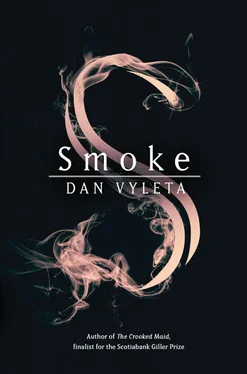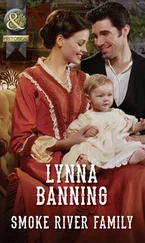“Quick now, Mr. Cooper. I promised I’d keep the light off as much as possible. It’s against our rules.”
Livia hovers behind them, watches Lizzy work.
“What do you know about nursing?” she asks, unable to reconcile what she is seeing with her knowledge of the girl. “You’re a maid.”
“I help out when a miner gets injured. Cuts, burns, smashed limbs. Got ’prenticed to it when my pa was brought in one night. Broken spine.”
“What happened to him?”
Lizzy’s shoulders stiffen.
“What do you think happens to a man with a broken spine?”
Again Smoke leaps from her mouth. Again it carries no smell. As it turns to Soot it joins the coal dust on the floor, the walls, their skin and clothing. Lizzy takes no notice. She turns to Charlie, and gives him instruction to fetch a bucket of water from a barrel farther down the tunnel outside; a rope is fastened to the tunnel wall and will guide his way. The moment Charlie is gone, Lizzy returns her attention to Thomas, never once looking at Livia. It is as though she has wished her out of existence. So marked is the reversal of their former relationship that Livia finds herself intrigued rather than vexed.
“Why are you angry with me? Because I caught you stealing?”
“I wasn’t stealing.”
“You were. I caught you red-handed, rifling through the pile of presents.”
“I wasn’t stealing,” Lizzy repeats. “I was wanting to add a present. Hide it in the pile.” After a moment she adds, “For him,” and points at Thomas with her chin. “And then you came in and called me a thief.”
“You are lying. I saw you smoke: thick green shrouds. It was as good as admitting it.”
Now Lizzy does look at her. It’s a hard look. Coal has caught in her lashes and lends a startling beauty to her eyes.
“I was angry, that’s all. I could’ve scratched out your eyes.”
Still Livia does not believe her. “You never said any of this. And you didn’t hold any present. Nothing of your own.”
“I shoved it down my blouse. Oh, I know, I could’ve showed it to you, and explained. But I couldn’t stand it. You’d have laughed at it, it was so pitiful next to all your splendour. And of course you would’ve read my note, and made fun of it.” Her voice drops to a hiss. “It was for him , not you.”
Livia is taken aback by the force behind Lizzy’s words.
“And he ?” she asks. “Would he not have laughed? At your pitiful present and your note?”
“Perhaps not.”
At last Livia understands.
“You like him.”
Lizzy’s chin rises with the answer. Back in the manor house, Thorpe would have slapped a servant for such a show of pride.
“He looks at everyone the same. You, your mother, the servants. Not friendly, like, but the same. High and low.”
Livia considers this, remembers her own encounters with Thomas’s eyes. “He looks at one as though he means to search one. Down to one’s petticoats. Strip one of all secrets. It isn’t a pleasant look.”
But Lizzy only shrugs. “I don’t mind. I haven’t got nothing to hide.” She sighs, bends over him. “He was handsome then. He’ll be ugly now forever.”
“Hush! He might hear you.”
Again anger returns to Lizzy like the gust of a draft. “So? This one, he’s not afraid of the truth.”
She falls silent, turns back to her patient, her fingers stained with coal and blood.
As she watches Lizzy get on with her work, Livia marvels at how much the girl has seen and understood. And from what? Three or four moments of interaction. No, not interaction: less than that. Proximity. A greeting or two, a look exchanged as she passed Thomas in the corridor. And yet she has seen him more clearly than Livia ever did.
She takes a step to the side, for a clearer view, and studies Thomas. His face is laid bare. The girl is using a razor to shave the hair around the wound. Despite her efforts with the washcloth, the coal dust is everywhere and has already seeped into the open skin. It will be there forever, an ink stain blooming in his hairline and eating into the upper portion of the cheek. The top part of the ear is gone, the stump swollen and knotty. Ugly. Yes, no doubt. But for the first time Livia sees something in Thomas she has missed before. Nobility: something quite separate from bloodlines and the lottery of birth. His eyes are open, unseeing. Soon a bandage covers one of them and his head is swathed in layers of cotton, quickly turning from white to grey.
Charlie returns, laden with a six-gallon bucket, black water slopping over its rim. When Livia steps over to help him, an urgent whisper rises up from the sickbed, like the hiss of a kettle.
“Fever,” Lizzy says, dowsing the lamp. “He is talking in his sleep.”
The next instant they have returned to a darkness given texture by the ravings of the sick.
ф
As Livia soon discovers, there are no days in the dark, no nights. They eat when they are hungry, relearning the sense of taste disassociated from sight; sleep on the bunk beds when they tire; walk the dark tunnel beyond their door when they require exercise. There are other rooms down here, connected by a system of rope handrails that assist navigation. Some are filled to the bursting with food, clothes, furniture, tools, as though the miners are preparing for a siege. Two rooms hold giant water barrels; one is a communal latrine. Beyond that the tunnel leads to the sheer wall of a coal face, oddly soft to the touch.
People come and go. Lizzy does not live with them, but looks in periodically, changing the bandages and searching the wound for signs of rot. Mr. Mosley also stops by at irregular intervals, as does Jake, blandly inquiring after Thomas’s condition. At times they are accompanied by other men, known to Livia only by their voices, or by their outlines when Lizzy briefly lights a lamp. These do not introduce themselves. Nor do they ask any questions; avoid the use of names even amongst themselves. If the men are curious what they are doing there, these three scions of the gentry, not one of them puts it into words.
Listening in to their conversation, Livia gathers that they are all part of the inner circle of whatever revolution is brewing here, down in the depths of the earth. Her sole interaction with one of these “Union Men” occurs when she feels her way into the latrine and, with outstretched hands, suddenly comes into contact with a man’s face and wiry whiskers, hanging waist-high in the darkness. It comes to her that he is squatting there, trousers around his ankles. She gives a cry and recoils.
“I am sorry! I didn’t know—”
The man answers with a husky laugh.
“Sorry about what, lassie? Dark as a badger’s bum down here. We could all be running around with no clothes on for all anyone would know about it.”
She hears him rise, pull up his trousers.
“Don’t ya worry, now, I’ll leave you in peace. Guard the door if you like, make sure you’ve got yer privacy. You young ones are shy about this sort of thing.”
She hears him walk off, stamping his feet loudly, so she knows where he is. It is just as well she would not know him from Adam if they met in the light.
ф
In this sightless, featureless world in which she finds herself, the one thing that remains to her is talk: whispered conversations in the void, sitting on the floor, more often than not, her shoulders leaned back against the wall, and speaking as one does in one’s own head, with a newly found abandon. Most of the time she talks to Charlie. To her surprise, their talk often drifts into argument.
“What did you think of me when we first met?” she will ask, careless in this darkness of the vanity unmasked by her question.
Читать дальше












